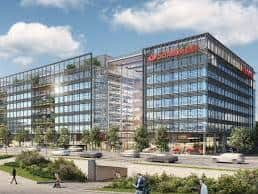Small businesses in Milton Keynes may not recover from Covid crisis until 2022, say experts
and live on Freeview channel 276
They say many will have to wait until as long as May 2022 to see signs of recovery. And meanwhile 21 per cent of them are not sure if will survive the pandemic,
Milton Keynes-based Santander UK has lent more than £4bn of lending to small businesses through the government-backed Bounce Back Loan scheme
Advertisement
Hide AdAdvertisement
Hide AdTheir research found more than a third (35 per cent) of SMEs based in the South East found their company has been performing ‘badly’ since the outbreak of the pandemic, with respondents seeing their profits slump by 18.4 per cent on average.


Unsurprisingly, mental health issues are a growing concern for small business owners. One-in-ten people running their own business reported a decline in their mental health since the Covid-19 outbreak, with 49 per cent stating they would be unlikely to seek support.
A staggering 23 per cent of respondents were unsure whether they want to continue running their business as a result of the impact on their mental health.
Susan Davies, head of business banking for Santander UK, said: “Small businesses have proven their resilience so far, and their hunger to survive and thrive is palpable. With the growth of remote working, small businesses across the country will be at the forefront of our economic revival, but 2021 will be a crunch year for many, with a lot riding on a successful vaccine rollout."
Advertisement
Hide AdAdvertisement
Hide AdShe added: “While there is no ‘silver bullet’ solution, extensions to VAT deferrals, the furlough scheme and business rates relief could provide businesses with additional breathing space. We have been working tirelessly to support small business owners throughout the pandemic - from online workshops, ecommerce training and mental health support – and we will continue to help them find solutions to the huge challenges they are currently facing.”
A total of 13 per cent of SMEs based in the South East have started or increased sales through a dedicated online shop as a result of the Covid-19 pandemic. However 68 per cent stated that selling their product or services online or through social media was not an option.
The disparity makes clear that there a significant number of businesses that are simply unable to generate revenue, reiterating the importance of additional support through Government lending schemes and tax reliefs, say Santander
SMEs run by people from ethnic minority backgrounds experienced the most significant decline in business activity, with almost half (47 per cent) seeing a dip since the COVID-19 outbreak. According to the data, 67% of businesses run by ethnic minorities were operating ‘well’ at the start of last year, compared to just 20% when the pandemic hit. The difference (33 per cent) was less extreme in non-ethnic minority run businesses, where respondents experienced a decline in performance from 58 per cent to 25 per cent.
Advertisement
Hide AdAdvertisement
Hide AdIn addition to the £4 billion of financial support provided through the Government-backed Bounce Back Loans (BBLS) to SMEs since the scheme launch, Santander UK has harnessed its business insight and sector experts in order to provide vital non-financial support across the UK.